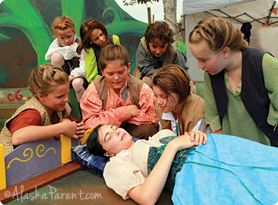
The play's the thing
How your kids can benefit from the performing arts
Story by Jamey Bradbury
Photography by T.B. Photography
Your son or daughter doesn’t have to be a ham to get involved with – and reap the rewards of – school-based or community theatre. Outgoing kids, shy kids, teens and tots can all benefit from the performing arts. And as a parent, you can play a part behind the scenes by encouraging and supporting your star of the stage.
dramatic rewards
“In modern society, we emphasize things like good physical health, but we don’t talk about the emotional health of young people,” explains Shane Mitchell, artistic director of Anchorage’s TBA Theatre.
By providing a tool for communication and a safe space where kids can explore difficult emotions, theatre helps young people learn positive ways to express themselves. And that, suspects Shane, is the first step toward solving problems like bullying.
“I look at the terrible things that happen with kids,” he says, “and I ask myself: If they had a better way to express themselves, would this be happening?”
Performing as part of a group also shows young people how to work as part of a team, and how to think creatively to solve problems.
“High school is where students start to squash their imaginations because they’re trying to figure out their place in the world,” describes Erin Mitchell, drama director at South High School. “But staying involved in the arts through that process keeps them creative thinkers. And I don’t think there’s a CEO in the world who doesn’t see the value in imaginative thinking.”

set the stage for success
Even the audition process can equip kids with skills that will help them later in life. “Learning how to put your best foot forward and to value yourself even when someone else tells you no,” says Erin, “that kind of thing prepares young people for living in the adult world.”
For kids looking to audition for community theatre, Shane advises parents to call ahead and find out what your child can expect. At TBA Theatre, for example, the audition process starts with a group activity, after which a few people read a scene together, before your child is expected to perform alone.
Regardless of the theatre company your son or daughter gets involved with, Shane’s best piece of advice is: “Prepare your child for the audition because the last thing you want is for him to have an experience so negative he doesn’t want to try it again.”
backstage beginnings
Of course, your ingénue doesn’t have to start her theatre career by starring in a production. Kids who are shy or simply want to learn about the performing arts can begin by working backstage. “They’re still a part of the community and the creative process without the risk of being in front of an audience,” says Erin, adding that working backstage also lets actors learn as much through observation as they do by performing.
You can help your children get the most out of the theatre. For community productions, go to the first rehearsal to let your child know you care, then let him experience the process on his own. Talk to her about rehearsal afterwards, but try not to emphasize whether she has any lines or when she’s onstage. Instead, ask, “What did you learn today?”
“Steer your youngster toward how great it is to be part of a significant thing, not the significant thing,” advises Shane.
Help your teens honor their commitment to the play they’ve signed up for, and remind them, above all, to have fun. “If a performer is stressed about their lines, they can’t be as creative,” says Erin, pointing out that high school theatre is a great place to practice taking risks. “It’s a peer environment where you learn to work with different personalities and work past the judgment of others in a supportive atmosphere.”
spotlight on family
Even if your kids are never in a public performance, you can make theatre part of their lives. “Every parent has the ability to make a puppet theatre out of a box,” says Shane. He encourages parents to involve their kids in character-based play and storytelling. “There are lots of ways to be involved in the performing arts that aren’t throwing yourself in front of 300 people.”
Get involved in your church’s Christmas pageant, or ask your Scout leader if your son or daughter can work on a theatre merit badge. And take your kids to plays, suggests Shane: “You might not think your kid will sit through an hour-long performance, but they’ll begin to be intrigued by the environment.”
The best part? You’ll reap the same benefits from the theatre as your kids, says Erin. “The arts fulfill a basic human need in us to create or build something. Theatre is a great way to learn about yourself at any age.”









